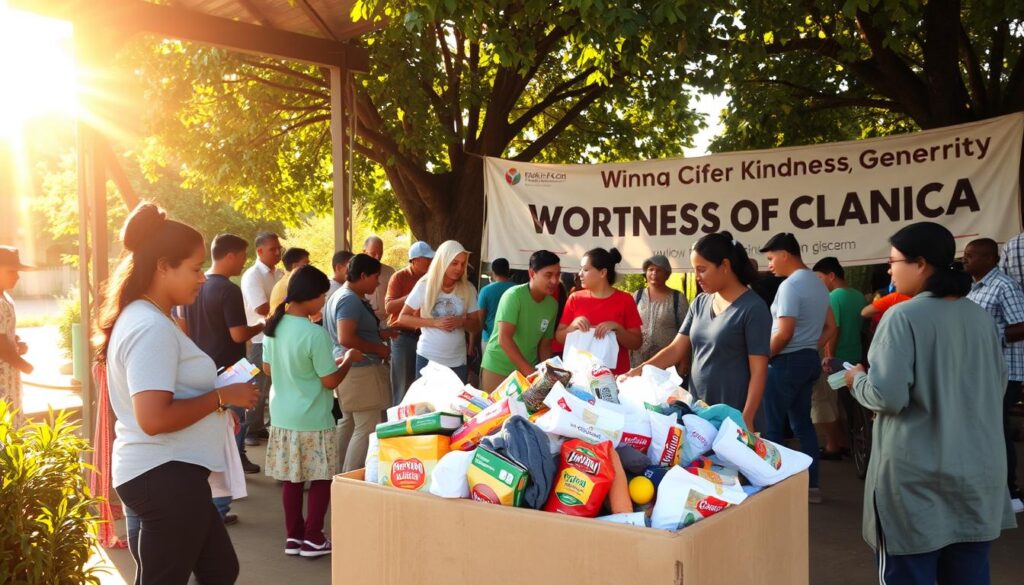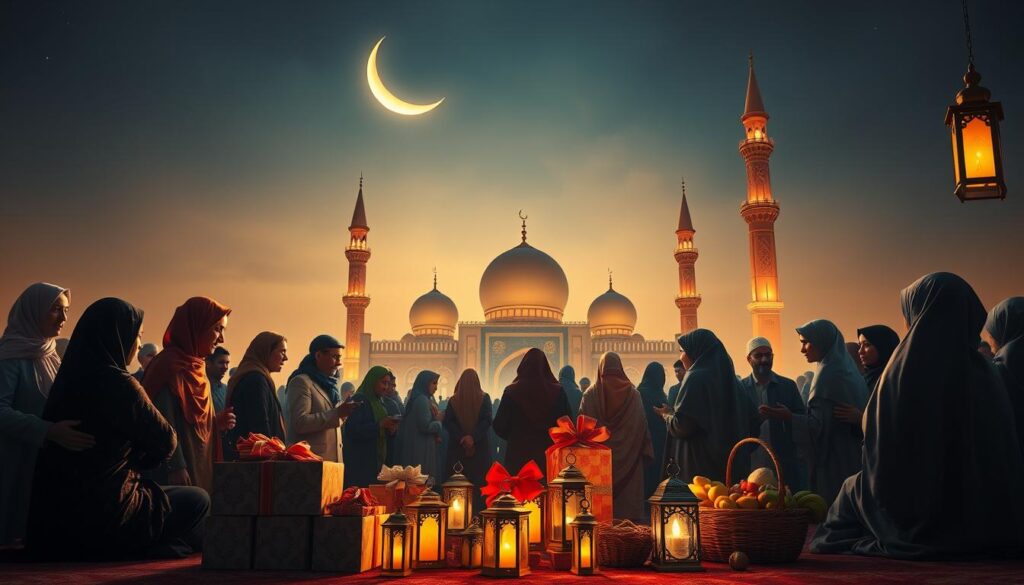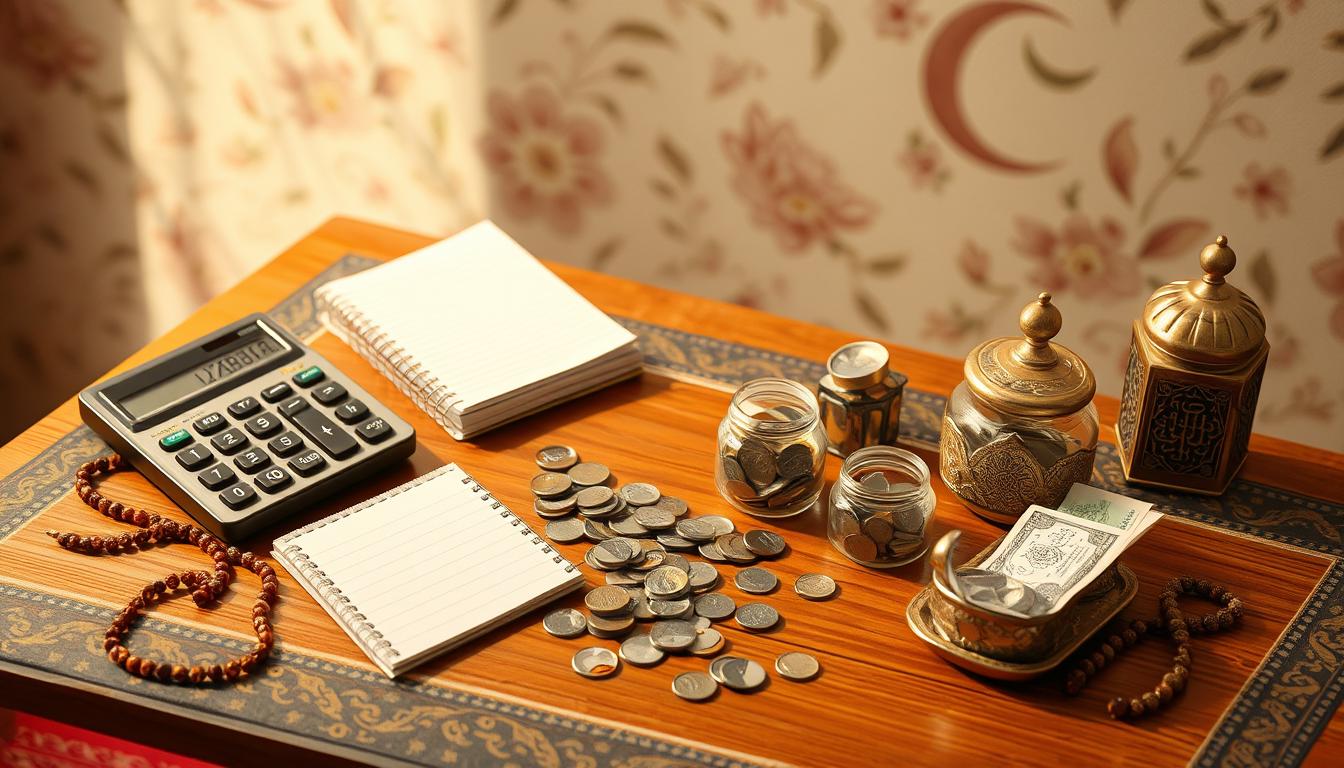We aim to change lives through faith-based work. Understanding Zakat is key. Zakat is a major part of Islam, focusing on helping those in need. It’s 2.5% of what you own that’s eligible.
When we plan our Zakat, we make sure it’s meaningful. Setting Zakat goals helps us be fair and kind. This way, we can help our communities.
We can build a better world together. By fulfilling our Zakat, we help people get skills and start businesses. This empowers them to live better lives.
Key Takeaways
- Setting Zakat goals is essential in promoting fairness, equality, and compassion.
- Zakat planning helps ensure that our giving is consistent and meaningful.
- Islamic charity goals, such as supporting orphans and providing clean water, can be achieved through effective Zakat planning.
- Zakat is one of the Five Pillars of Islam, stressing the need to help others.
- Setting Zakat goals can help create a more just and compassionate society.
- Zakat planning can support initiatives like skills development and small business funding.
Understanding Zakat and Its Importance
We aim to educate and empower individuals to give back to their communities through Zakat. It’s a mandatory charity for every eligible Muslim each year. Zakat is based on income and the value of possessions. The common minimum amount is 2.5% or 1/40 of a Muslim’s total savings and wealth.
The Zakat definition is rooted in Islamic principles. Its Zakat calculation is straightforward. Individuals must pay 2.5% of their total wealth, less any liabilities, if they meet the nisab threshold. The nisab threshold is the value of 87.48 grams of gold or 612.36 grams of silver at current market rates.
What is Zakat?
Zakat is a powerful tool for creating positive change in communities. It is calculated at a rate of 2.5% of an individual’s net Zakatable wealth, after deducting liabilities. Zakatable assets include cash, savings, gold, silver, business assets, investment properties, agricultural produce, livestock, stocks, and shares.
The Spiritual Significance of Zakat
The spiritual significance of Zakat lies in its ability to promote economic stability and support the poor and less fortunate. By giving Zakat, individuals can help create a more equitable society. They also demonstrate their commitment to Islamic values.
How Zakat Benefits Communities
Zakat benefits communities in numerous ways. It provides essential resources, supports education, and promotes economic stability. Zakat recipients are categorized into eight groups: the poor, the needy, Zakat administrators, those whose hearts are to be reconciled, those in bondage, those in debt, those in the cause of Allah, and the wayfarer.
By understanding the Zakat distribution process, individuals can ensure their donations make a meaningful impact. We encourage everyone to learn more about Zakat and its importance in creating a more just and compassionate society.
Key Considerations for Setting Zakat Goals
When we aim to help our community, we must think about our money and the needs of others. By following Zakat guidelines, we can plan our Zakat giving wisely. Setting a Zakat target is key to making a real difference.
Assessing Your Financial Situation
To set good Zakat goals, we must look at our income, spending, and what we own. This tells us how much we can give. Online tools, like a Zakat calculator, can make it easier.
Reflecting on Personal and Community Needs
Thinking about our own needs and the community’s helps us choose where to give. We might look at poverty, education, and health. This way, our Zakat can really help.
Some important things to think about when setting Zakat goals include:
- Figuring out our Zakatable wealth
- Learning about who can receive Zakat
- Finding trustworthy charities
By taking these steps and thinking about our money and community, we can plan our Zakat well. Remember, Zakat is more than giving. It cleanses our souls and brings people together.
| Zakat Category | Rate | Eligible Recipients |
|---|---|---|
| Surplus personal and business wealth | 2.5% | Poor, debt-ridden individuals, and collectors |
| Agricultural produce | 5% or 10% | Homeless, and those in need of assistance |
Steps to Create Your Zakat Plan
We think making a Zakat plan is key to fulfilling our Islamic duties. We offer tools like a Zakat calculator to help you make a plan that fits you. This tool makes figuring out your Zakat easier and more accurate.
To make a Zakat plan, you need to define your Zakat percentage and set goals. Think about your money, what you and your community need, and use a Zakat calculator. Setting clear goals helps you stay focused and adjust as needed.
Important things to think about for Zakat include:
- Understanding Nisab, the wealth threshold for Zakat
- Calculating Zakat at 2.5% or 1/40 of your savings and wealth
- Applying Zakat to cash, investments, and business assets
By following these steps and using a Zakat calculator, we can fulfill Zakat and help our communities. Remember, tips like regularly checking and updating your plan can keep you on track.
The Role of Umar Khan Charity Organization
We aim to change lives through lasting, faith-based help. At Umar Khan Charity, our goal is to give vital support to needy communities in Uganda. We do this by following Islamic values of kindness and justice.
Our work in Islamic charity is to really help those in need. We focus on giving food, education, and jobs to thousands of families in Uganda. Our main projects include:
- Annual support for over 5,000 families through Food Aid and Zakat Distribution programs
- Thousands of Iftar meals given out each Ramadan to families across Uganda
- Educational Sponsorships for students and building new schools in poor areas
By working with Umar Khan Charity, people can make sure their Zakat helps others. This helps society and follows Islamic charity values. We want to make a real change in the lives of those we help. We invite you to join us in this effort.

Together, we can build a better future. We will do this by following humanitarian and Islamic charity principles.
| Program | Number of Beneficiaries |
|---|---|
| Food Aid and Zakat Distribution | 5,000 families |
| Ramadan Feeding Programs | Thousands of families |
| Educational Sponsorships | Hundreds of students |
Effective Methods for Distributing Zakat
We suggest looking into the best ways to give out Zakat. This ensures it helps those in need. Zakat can be given directly to people or through charities, making giving easier.
Direct giving lets you connect with those you help. It’s a strong way to bond with your community. Working with charities, though, offers a more organized way to help. Charities use their skills and resources to make your donation go further.
Donating more than money is also a good idea. Giving goods like food, clothes, and education is very helpful. This way, we can make sure Zakat reaches those who need it most and brings real change.
- Assessing the needs of the community and identifying areas where support is most needed
- Researching and partnering with reputable organizations that specialize in Zakat distribution
- Providing in-kind donations to complement cash donations and address specific needs
By carefully choosing how to give Zakat, we can make a big difference. This way, our giving matches the spirit of Zakat and our community’s values.
| Method | Description |
|---|---|
| Direct Giving | Providing support directly to individuals in need |
| Organized Charity | Partnering with charities to distribute Zakat |
| In-Kind Donations | Donating essential goods and services |
Leveraging Technology in Zakat Giving
We see how technology helps with Zakat donations, making it simpler for people to give. Online platforms and mobile money transfers make giving Zakat easy and safe. Now, we can donate from anywhere in the world.
Online Donation Platforms
Online donation platforms have changed how we give Zakat. They offer a safe and clear way to donate. These platforms have low fees, so more money goes to those who need it. We can support different charities and see how our donations help.
Mobile Money Transfers in Islam
Mobile money transfers are key in Islamic finance. They let us send and get money safely and quickly. For Zakat, they help us donate, even where banks are hard to find. This tech can help more people around the world.
- Mobile money transfers make Zakat donations easier and cheaper.
- They are safe and clear because of strong encryption and rules.
Using technology makes our Zakat donations better and more effective. It helps more people and communities. As we use more digital tools, we should focus on online Zakat donations and mobile money transfers. This way, our giving stays true to Islamic values.
| Benefits of Online Zakat Donations | Benefits of Mobile Money Transfers |
|---|---|
| Convenience and accessibility | Security and transparency |
| Low transaction fees | Increased reach and impact |
Volunteer Opportunities with Umar Khan Charity
We invite you to explore volunteer opportunities with Umar Khan Charity. This organization focuses on humanitarian work. By volunteering, you can directly help those in need.
Volunteering with Umar Khan Charity lets you see the needs of vulnerable communities. You can use your skills and time to make a real difference. Here are some ways to get involved:
- Participate in local events and fundraisers
- Help with disaster relief efforts
- Support education and healthcare initiatives
At Umar Khan Charity, we think volunteer opportunities are key to positive change. Together, we can change lives and have a lasting impact.
Join us in our mission to make a difference. With volunteer opportunities at Umar Khan Charity, we can create a brighter future for everyone.
| Volunteer Opportunity | Description |
|---|---|
| Event Volunteer | Assist with local events and fundraisers |
| Disaster Relief | Support disaster relief efforts |
| Education Initiative | Support education and healthcare initiatives |
Engaging Your Community in Zakat Goals
We think community engagement is key for Zakat awareness and support. Working together, we can make Zakat’s impact bigger. This means more people helped and lasting change.
Hosting fundraising events is a great way to get our communities involved. It helps us raise money for good causes.
Using social media for charity is another smart move. We can share Zakat info and its benefits on social media. This boosts awareness and gets more people involved in Zakat.
Here are some ways to get your community involved in Zakat:
- Organize charity runs or auctions to raise funds.
- Start social media campaigns to talk about Zakat.
- Work with local mosques or Islamic centers to promote Zakat.
Together, we can achieve more and bring positive change. Let’s get our communities involved in Zakat goals and help those in need.
| Country | Zakat Compliance Rate |
|---|---|
| Indonesia | 3.49% |
| Malaysia | 5.1% |
| Pakistan | 2.5% |
Tracking and Measuring Your Zakat Impact
We think it’s key to track and measure Zakat impact. This ensures our giving is effective and responsible. By setting up an accountability system, we can see how Zakat is being used. This lets us know where we can do better and adjust our strategy.
Being transparent in charity builds trust with donors and stakeholders. We aim to share updates on Zakat impact regularly. This includes how many people are helped, how much money is given, and project progress. It makes donors confident their help is changing lives.
Some important things to consider when tracking Zakat impact are:
- Setting clear goals and objectives for our Zakat giving
- Establishing a system for monitoring and evaluating the distribution of Zakat funds
- Providing regular updates and reports to donors and stakeholders
- Conducting regular assessments to identify areas for improvement
By focusing on accountability and transparency, we make sure our Zakat efforts are impactful. We fulfill our duties as responsible donors.
Seasonal Considerations for Zakat Giving
Ramadan is a special month for Zakat giving. It’s a time for Muslims to focus on their charitable duties. But, Zakat is a yearly duty, and we can give all year to meet our obligations better.
By planning for Ramadan and giving all year, we can make sure our Zakat is consistent and meaningful. It should reflect Islamic values of kindness and fairness. Key points for seasonal Zakat giving include:
- Understanding the different types of wealth that are subject to Zakat, such as growth wealth and earth yield
- Recognizing the importance of paying Zakat on time, as incentives exist for timely payment, including religious obligations and possible rewards
- Being aware of the Nisab threshold for Zakat ownership, which is specified as 613.35 grams of silver or 87.49 grams of gold
As we plan for Ramadan Zakat and year-round giving, we should think about the benefits of Islamic charitable giving. It can purify us and bring multiplied rewards. By giving Zakat consistently and informed, we can positively impact our communities and fulfill our Muslim duties.

| Type of Wealth | Zakat Due Date |
|---|---|
| Growth Wealth | After 12 full lunar months of ownership |
| Earth Yield | At the time of harvest |
By understanding these points and planning well, we can make sure our Zakat giving is effective and follows Islamic principles.
Encouraging Family Participation in Zakat Efforts
We think it’s great to get our families involved in Zakat. It teaches kids about giving and helps them grow up with compassion. By teaching children about Zakat, we instill Islamic values in them.
Having family Zakat planning sessions is a good way to bond. It’s a chance to talk about our values and how we can help others. Important things to think about include:
- Understanding the family Zakat duty and how it affects us.
- Setting aside time for Zakat planning to fulfill our duty.
- Finding fun ways to teach children about Zakat.
Staying Informed on Zakat Regulations
It’s key to know Zakat rules to make sure our giving follows Islamic and local laws. By learning aboutZakat regulations, we can give Zakat with confidence. We know our actions are in line with Islamic values and help those in need.
Understanding Islamic Guidelines
As Muslims, knowing Zakat rules is vital. We need to learn about the wealth types subject to Zakat, the rates, and how to give Zakat. Keeping up with changes in these rules helps us give Zakat with purpose and clarity.
Navigating Local Laws in Uganda
Knowing both Islamic and local Zakat laws is important. This helps us meet community needs and follow local rules. The Umar Khan Charity Organization helps us understand these rules. Together, we aim to bring about positive change and a more caring world.






